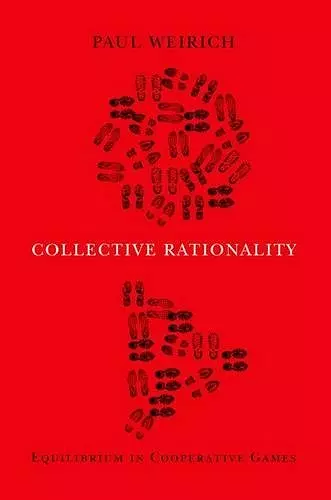Collective Rationality
Equilibrium in Cooperative Games
Format:Paperback
Publisher:Oxford University Press Inc
Published:12th Jul '12
Currently unavailable, and unfortunately no date known when it will be back
This paperback is available in another edition too:
- Hardback£95.00(9780195388381)

Groups of people perform acts that are subject to standards of rationality. A committee may sensibly award fellowships, or may irrationally award them in violation of its own policies. A theory of collective rationality defines collective acts that are evaluable for rationality and formulates principles for their evaluation. This book argues that a group's act is evaluable for rationality if it is the products of acts its members fully control. It also argues that such an act is collectively rational if the acts of the group's members are rational. Efficiency is a goal of collective rationality, but not a requirement, except in cases where conditions are ideal for joint action and agents have rationally prepared for joint action. The people engaged in a game of strategy form a group, and the combination of their acts yields a collective act. If their collective act is rational, it constitutes a solution to their game. A theory of collective rationality yields principles concerning solutions to games. One principle requires that a solution constitute an equilibrium among the incentives of the agents in the game. In a cooperative game some agents are coalitions of individuals, and it may be impossible for all agents to pursue all incentives. Because rationality is attainable, the appropriate equilibrium standard for cooperative games requires that agents pursue only incentives that provide sufficient reasons to act. The book's theory of collective rationality supports an attainable equilibrium-standard for solutions to cooperative games and shows that its realization follows from individuals' rational acts. By extending the theory of rationality to groups, this book reveals the characteristics that make an act evaluable for rationality and the way rationality's evaluation of an act responds to the type of control its agent exercises over the act. The book's theory of collective rationality contributes to philosophical projects such as contractarian ethics and to practical projects such as the design of social institutions.
Paul Weirich argues in this book convincingly for a new way of seeing collective rationality based on the simple and intuitive notion of compositionality: a group's act is rational if the members of the group act rationally. This book will suit anyone interested in normative decision theory, game theory or collective action. It is a thorough analysis of the normative basis for collective decision making in ideal cases. * Niklas Vareman, Analysis *
My overall conclusion is the Weirich's theory of collective rationality is a very precise, internally coherent, and highly impressive contribution to the literature. It deserves to be carefully studied in the years to come. * Martin Peterson, Notre Dame Philosophical Reviews *
ISBN: 9780199929016
Dimensions: 156mm x 234mm x 15mm
Weight: 399g
284 pages